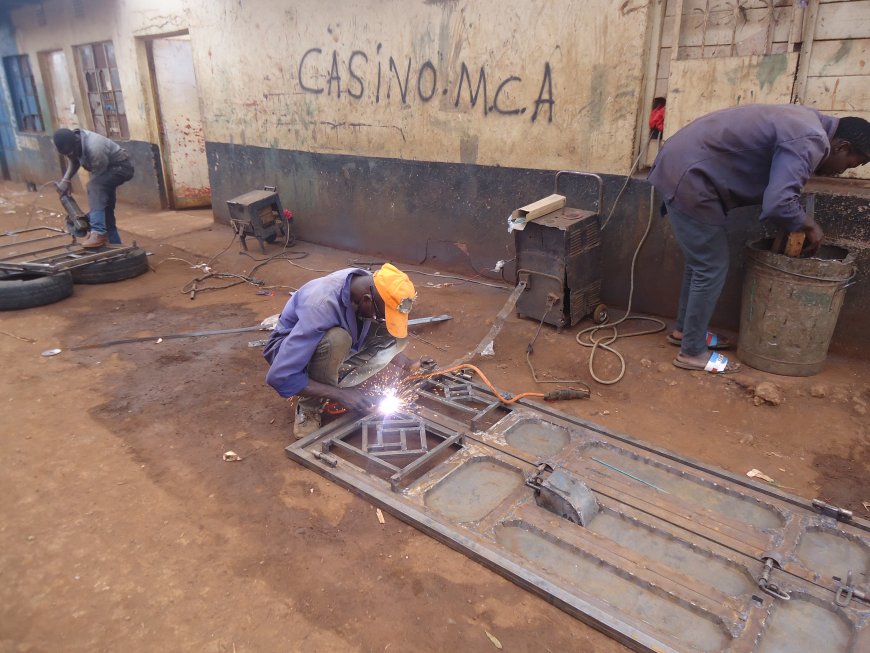Traders lament over soaring power charges

Nyeri, Thursday April 13, 2023
KNA By Samuel Maina
Traders in Nyeri are lamenting over the rising cost of power saying it poses a serious threat to their businesses.
The hardest hit by the new power tariffs that came into effect early this month are welders, posho millers, timber millers and printers who are now forced to either push the additional charges to their clients or cut down on production in order to reduce operational costs.
A number of operators have however opted to adjust the amount of money they charge their clients in order to remain afloat, while some have been forced to cut down production by closing down some of their businesses altogether.
Timothy Muriithi, proprietor at Nyeri Hi-tech Welding and Engineering workshop told KNA that in the last few months he has been forced to close one of his two shops as a matter of urgency due to the high operational costs thanks to runaway electricity charges.
In addition, he says he had to reduce his workforce from 12 to five, something he blames on the diminishing profit margins from his businesses.
“A few months ago, I used to purchase 25 units of electricity tokens with Sh500.Today the same amount of money can only give you a mere 15.7 units a change that has greatly affected my businesses which depend heavily on electricity. To make matters worse the economy is on a downward trajectory meaning few persons are visiting our yard to place orders due to constrained budgets while others are opting to go seek services elsewhere where prices are a bit friendlier,” decried Murithi.
Martin Wanjohi, who operates AP classics Kinyozi in Nyeri town says he opted to move to a smaller premise to salvage his business after the Energy and Petroleum Regulatory Authority (EPRA) announced new power tariffs at the beginning of this month.
He adds that he reminisces on the days he could use Sh300 per month for electricity compared to now where he has to fork out at least Sh1,500 per month, a transformation he terms painful.
“My business fully depends on smooth supply of electricity and so when the cost of power is hiked, it becomes quite hard for me to balance between making profit and retaining my clients. Faced with the harsh reality of either closing shop or operating at a loss, I decided to move to a place where I could get a cheaper premise instead,” he explains.
Daniel Mwangi, a beautician at Ziah Nails says they had to hike charges on their services to enable them remain in business owing to rising costs in overheads.
Mwangi argues that this was the only option they could have taken in order to be in a position to meet their bills including power charges and still remain with something to take home.
For Elizabeth Wamuyu, a French fries seller, the skyrocketing cost of electricity was the stroke that broke the camel’s neck and forced her to go for charcoal.
She also reverted to using firewood for her domestic cooking and reduced the number of appliances operating on electricity at her home just to cut down on power bills. “Firewood and charcoal are slower but at least cheaper and that is why I decided to switch from using electricity to charcoal in my business. I also ensure that most of my appliances that consume a lot of power like refrigerators remain switched off during the day in order to bring down the amount of power I consume in my house,” she disclosed.
In the new changes on electricity prices that were unveiled by EPRA, domestic customers consuming between 30 and 100 units per month will have their tariffs increased from sh21.99 to Sh26.10 per unit, which is a 19 per cent increase.
Customers consuming 100 units and above will have their tariffs increased from Sh27.92 to Sh31.75 per unit, a 14 per cent increase.
Parliament has already started debating a motion seeking to probe the rising costs of power in the country which threatens Kenya’s reputation among nations with the lowest cost of doing business.
The bill sponsored by Laikipia Woman Representative Jane Kagiri further seeks to bar Kenya Power and the Ministry of Energy from getting into any deal with Independent Power Producers (IPP) until the issue regarding the cost of living has been addressed fully.
Courtesy K.N.A
What's Your Reaction?
































































































































































































































































































